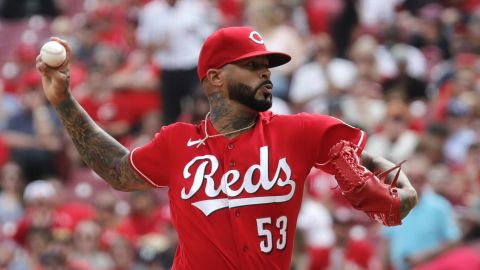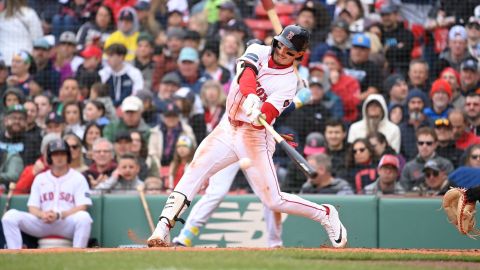Everyone knows that when East meets West — or vice versa — things can get lost in translation. Who'd have thought it would happen with a $100 million pitcher?
We all know the story. In November of 2006, the Red Sox paid over $51 million to begin negotiating with then-26-year-old star Japanese right-hander Daisuke Matsuzaka. A month later, following some rocky dealings with his agent, Scott Boras, Boston signed Matsuzaka to a six-year, $52 million-plus contract.
Dice-K had a solid rookie season in the States in 2007, going 15-12 with a 4.40 ERA in 32 big league starts as the Red Sox went on to win their second World Series in four years. The following season, despite a propensity to get himself into (and out of) jams on the mound, Dice-K put up great numbers, going 18-3 with a 2.90 ERA (despite an American League-high 94 walks) and finishing fourth in the AL Cy Young voting.
But when Matsuzaka decided to pitch in the 2009 World Baseball Classic in March, his relationship with the Red Sox grew slightly more strained. Boston manager Terry Francona asked for occasional updates on Dice-K from the Japanese team's staff since he'd be missing part of spring training, but the Red Sox didn't press any further. Dice-K won MVP honors for the second time at the WBC as Japan won its second straight title, but that meant the hurler didn't arrive at Red Sox camp until March 27, just 12 days prior to opening day.
So when Matsuzaka got shelled in his first two regular-season appearances for the Red Sox, subsequently spent much of the early going on the DL and had a lengthy stint in extended spring training in Fort Myers, Fla., questions were raised about his preseason training regimen. Should he have been pitching all-out for his country in the WBC? Did going 100 percent in March throw Dice-K off the typical major leaguer's annual timetable? Probably. That, in a nutshell, was the Red Sox' argument.
But Matsuzaka himself blamed something else for his lack of effectiveness: the Red Sox training program for pitchers, which didn't allow him to throw in between starts like he had back in Japan. In an interview with a Japanese newspaper late in July, Dice-K, who was 1-5 with an 8.43 ERA and an opponents' batting average of .378 at the time, attributed his troubles to the regimen the Red Sox imposed on him.
"If I'm forced to continue to train in this environment, I may no longer be able to pitch like I did in Japan," Matsuzaka is quoted as saying in the article (thanks to Alex Speier at WEEI.com). "The only reason why I managed to win games during the first and second years [in the U.S.] was because I used the savings of the shoulder I built up in Japan. Since I came to the major leagues, I couldn't train in my own way, so now I've lost all those savings."
Without the long, off-day throwing sessions, a practice the Japanese call nagekomi, Dice-K believed that both his arm strength and touch for throwing breaking pitches suffered. The Japanese article suggested that Matsuzaka wore out his shoulder in the WBC because the Red Sox would not allow him to practice nagekomi in his preparations for the tournament.
On the positive side, once Dice-K did make it back to the bigs in September, he was a vastly improved pitcher. In four starts for the Red Sox, he went 3-1 with a 2.22 ERA and 20 strikeouts in 24 1/3 innings.
What was the difference this time? It's not clear. In Fort Myers, Matsuzaka was subjected to what WEEI called a "rigorous workout program in the humid Florida summer," and his hard work got rave reviews from the Red Sox brass. The franchise's trainers reportedly communicated and worked with Dice-K to put together a compromised program that satisfied the needs of both sides.
"We try very hard to keep all of our pitchers healthy, productive, for not only the short term but the long term," Francona told WEEI. "We also try to understand — and we go to great lengths to attempt to do this — because communication in these areas is very important. And we will continue to do that. We don't just talk. We listen."
But Dice-K still didn't seem to completely buy in.
"They come armed with data and logic," Matsuzaka said in the Japanese article. "To counter that, I have to respond with my own logic, and that takes a lot of thinking and energy, but I can't back down on this one."
Who knew this could be such an issue?
I can't claim to be any sort of expert on pitching mechanics or on the proper preparation for a human shoulder to throw 200 innings at the major league level. I do understand that Matsuzaka has signed a contract with the Red Sox paying him an inordinate amount of money through the 2012 season. As a major investment of theirs, the Red Sox are rightfully worried about his short- and long-term well-being. Furthermore, they should be responsible for providing him with a training regimen that puts him in the best position to succeed on the baseball field, and they no doubt have people assigned to do precisely that.
This offseason, the Red Sox and their now 29-year-old pitcher have reportedly agreed on a conditioning program. Matsuzaka is expected to return to the States next month to start working out well in advance of spring training. Hopefully, it will continue to work out nicely and will have him ready to roll come April. If not, it could result in a philosophical rift that may not be so easily mended.
The two sides need to work together to get this right on a physical, emotional and spiritual level. Because a happy, healthy and productive Dice-K in the Red Sox rotation is a winning equation for both parties. That's a sentiment that both East and West should be able to understand.
***
NESN.com will answering one Red Sox question every day in November.
Monday, Nov. 23: Who's the most underrated person in the Red Sox organization?
Wednesday, Nov. 25: Who should be the Red Sox' fifth starter?



